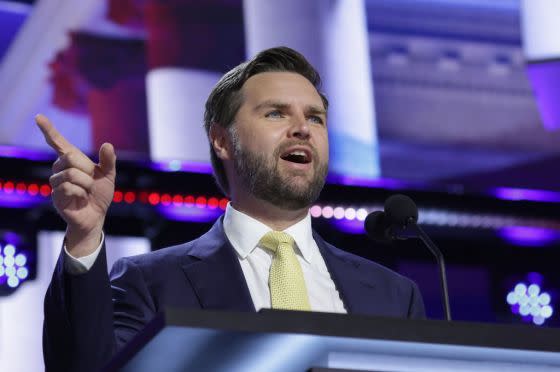The Infinitely Plastic J.D. Vance
- Oops!Something went wrong.Please try again later.

Among vice presidents, J.D. Vance would be the least plausible future president since Spiro Agnew in 1969. That’s the optimistic take. The pessimistic take is that he is the least plausible future president since Richard Nixon in 1953.
Whatever one makes of Vance as a potential future president, he is nonpareil as a candidate for the vice presidency. He has no legislative record to speak of, and—if we can set aside the fact that he once very publicly held the view that Donald Trump is an amoral lunatic utterly unfit for office—his rhetorical record isn’t much trouble, either. Not that he hasn’t said a lot of outrageous and stupid things. Vance is a Putinist social-media troll who described entitlement reform as a plot to “throw our grandparents into poverty … so that one of Zelensky’s ministers can buy a bigger yacht.” But nobody takes anything he says seriously—he is so transparently a man who will say whatever his betters require him to say to get what he wants from them. Telling people with money and power what they want to hear is the only consistent throughline in his career, from Hillbilly Elegy to the present day. Once an appendage of Peter Thiel’s, now he is an appendage of Donald Trump’s after a long and bitter apprenticeship of sycophancy.
In the short term, Vance probably will not be much help to the Trump campaign. He may help to motivate a few disaffected young men to climb up out of Elon Musk’s digital sewer for 20 minutes and actually cast a vote, but the Trumpist base he is meant to excite is already excited, especially after the attempted assassination of Trump in Pennsylvania. Vance’s native Ohio is already a reasonably reliable Trump state, and the idea that Vance will help the campaign connect better with Rust Belt and Midwestern voters is nonsense: Vance is an Ivy League lawyer and Silicon Valley money-monkey whose literary success came from writing about poor white Appalachians rather than writing to them or for them. Hillbilly Elegy was written for the class of social and economic benefactors who helped Vance along in life, not for the plebs for whom Vance has been appointed tribune without anybody having asked them. When Vance did ask, in his Senate campaign, he ran 10 points behind gubernatorial candidate Mike DeWine, the picture of an “establishment” Republican.
It is tempting to believe that Trump chose Vance because the former president is confident about his prospects in November and wants Vance to lead his legacy project, putting a cap and a seal on the old-school Republican Party and announcing that Republican welfare chauvinism—which is to say, national socialism (and those are the right words, though I do not mean to indicate Nazism) as practiced in the United States—will be the only possible mode of Republican politics going forward. But that assumes many things that are not obviously true: that Trump has a long-term plan; that Trump is interested in political ideas; that the dynastically minded quasi-royalist Trump prefers Vance as the face of the Republican future rather than one of his own children, etc.
There’s a more likely explanation: Trump likes Vance well enough to endure his company during the campaign (and maybe a bit of it afterward, if victorious); he regards Vance as an obvious yes-man and sycophant (which Vance obviously is, and sycophancy and moral plasticity are the stuff out of which great vice presidents are made); he accurately regards Vance as disposable. Ohio voters will probably elect another right-wing populist knucklehead without too much fuss. And, if Vance proves unsatisfactory in some way, there are scores of easy replacements out there, from Tucker Carlson to Marco Rubio to Alex Jones—whatever sort of man necessity requires.
Using Vance to transform the Republican Party would be a fool’s errand in that the party already has been transformed. If William F. Buckley Jr. were to offer his services to today’s GOP, Republican leaders would dismiss him as a harpsichord-playing elitist and replace him with some suburban dork who pretends to be a cowboy. Ten years ago, I might have written that Ronald Reagan’s record on abortion would be disqualifying in today’s Republican Party, but—no more!
Donald Trump, we can safely assume, does not spend his evenings reading the works of Immanuel Kant. He is a man for whom people are means, not ends, and Vance is a means toward small and relatively unimportant ends.
It is the job of a vice president to be unimportant. Kamala Harris’ great failure is that she matters—she isn’t good at anything, but Democrats believe that they cannot pass over her for a better candidate without looking like racists and sexists and people who are insufficiently respectful of the first black South Asian woman from an immigrant family to serve in John Nance Garner’s “bucket of warm piss.” Vance has every indicator that he is capable of being a man who profoundly doesn’t matter. It is a kind of skill.
Vance is whomever Trump needs him to be—the perfect would-be vice president, a quite green second banana. Vance can be anybody the day calls for.
Which is to say: He is nobody.
